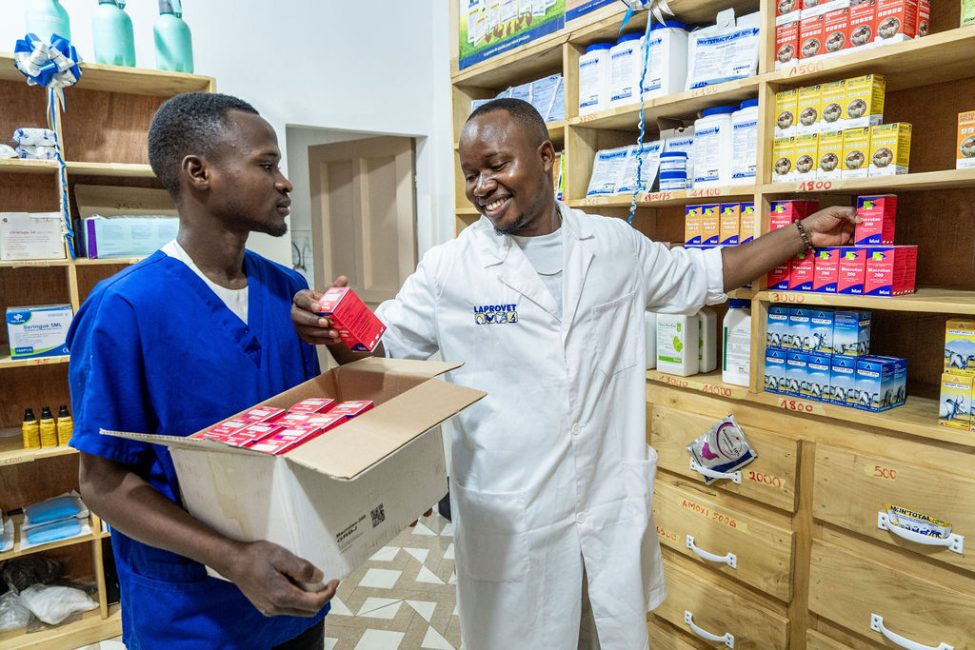On February 1st, the Natitingou veterinary clinic officially opened its doors. Months of hard work went into the preparations, led by veterinarian Dr. Dimas and our team, ensuring everything was ready for the inauguration. Local television covered the event, alongside dozens of doses of rabies vaccines—a disease that still occurs in the region and claims victims every year, especially among children.
Access to veterinary medicines: a major challenge
In northern Benin, access to veterinary medicines remains a major challenge. Sometimes, a correct diagnosis is made, but the animal still dies because the right treatment isn’t available quickly enough. This leaves both farmers and veterinarians powerless against disease.

Adamou, livestock farmer in Boukoumbé, supported by Patient, CAHW staff member. ©Loïc Delvaulx
As Adamou, a sheep farmer from Boukoumbé, explains:
“One of our biggest problems is livestock mortality. There is no pharmacy in Boukoumbé, so we have to go all the way to Natitingou to buy medicines. But diseases don’t wait. The veterinarian comes, but doesn’t always have the products with him. Then we have to wait. Sometimes it’s too late, and the animal dies.”
His testimony reflects what many farmers in the region experience. Limited access to veterinary medicines is a major obstacle to animal health. In several municipalities, veterinary pharmacies are far apart. People often have to travel long distances for treatment. Veterinarians may diagnose the problem, but sometimes cannot provide care due to the lack of available products. Yet farmers still have to pay for the consultation, causing frustration and discouraging some from seeking veterinary help.
The risks of alternative solutions
Due to limited resources or lack of quick solutions, many still turn to traditional remedies or purchase illegal medicines and antibiotics from Nigeria or Togo. This not only increases livestock losses but also poses risks for both humans and animals. Incorrect use of antibiotics can lead to resistance, making treatments less effective. In West Africa, antibiotic resistance remains a major public health issue, claiming thousands of lives each year.
The veterinary clinic in Natitingou: regular and reliable access

Harouna, qualified veterinary technician, working at the Natitingou veterinary clinic. ©Loïc Delvaulx
The Natitingou veterinary clinic provides regular and affordable access to quality products, reducing the risks associated with parallel medicine markets.
Adamou’s story illustrates the ongoing importance of animal health in Benin, especially in rural and semi-urban areas. Many farmers have valuable knowledge, but access to veterinary care remains limited by infrastructure, high costs, or cultural practices.

Jeanne Biadaja, livestock farmer in Natitingou, supported by the veterinary clinic. ©Loïc Delvaulx
Jeanne, a passionate livestock keeper, also shares her story. She keeps sheep, chickens, and recently goats. She lets her animals graze on a plot in the city center and closely monitors other parcels outside the city to prevent theft. Though her age prevents her from doing all the work herself, she spends much of her time observing her animals on her chair.
“When I see that an animal is unwell, I observe it carefully, note the symptoms, and sometimes prepare natural remedies. If I’m unsure, I call my son. He’s a veterinary assistant in the south of the country and advises me on what to do.”
This statement clearly demonstrates Jeanne’s attentiveness and strong bond with her animals. She is fortunate to have a trained family member to support her, but not all farmers have that opportunity. This is why the proximity of a reliable veterinary clinic is so crucial.
A local clinic serving livestock farmers
The Natitingou veterinary clinic provides everyone with direct access to professional advice, seven days a week. Farmers can seek help at the first sign of illness or abnormal behavior, receiving immediate follow-up. This accessibility enables early detection of diseases, tailored advice, and timely treatment, significantly reducing the risk of mortality and disease spread. The clinic has become a trusted reference point, strengthening both animal health and food security in the region.
In a context where animal diseases have direct consequences for income, food security, and public health, expanding the veterinary network is a key step in the One Health approach. Initiatives like the Natitingou clinic now provide farmers like Adamou and Jeanne with regular veterinary guidance, contributing to the sustainability of livestock systems in northern Benin.
Eight months of operation: encouraging results

Dr. Dimas (30), private veterinarian and person in charge of VetCarePlus clinic. ©Loïc Delvaulx
In just eight months, the Natitingou veterinary clinic has become a key reference point for livestock farmers in northern Benin. More than 3,000 farmers have already visited the clinic, and over 200 rabies vaccinations, 1,000 antibiotic treatments, and 3,000 antiparasitic treatments have been administered. These figures demonstrate a real need and growing trust in local veterinary services.
At the same time, Community Animal Health Workers continue their prevention and awareness activities in the villages, further amplifying the impact on animal health and food security in the region.

